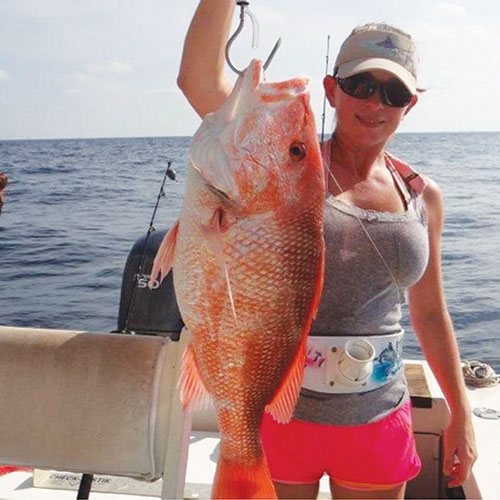
What Happened to Our Fish
An Education Series for Coastal Anglers
For Recreational Fisherman by Recreational Fisherman
The Trump administration is listening to American fishermen – a vast departure from the previous administration’s continuous actions to take recreational fishermen off the water.
The Gulf Council manages the Gulf of Mexico’s Red Snapper fisheries. This year the Council legislated for recreational anglers to have only 3 days to fish with their own boats in federal waters. (However, federally licensed for-hire charter boats were granted the rights to sell an additional 46 days of access to…anyone who can afford to pay.) Recreational fishermen denounced this decision, and rallied all across the Gulf through several organizations and over social media.
The 3-day fishing “season” came and went.
The combined voice of angry fishermen was heard, and the U.S. Commerce Department stepped in. Their subsidiary, the National Marine Fisheries Service, through its corrupted Gulf Council, clearly failed to manage our fisheries in an equitable manner as mandated by fisheries laws. As a short-term solution, the Commerce Department proposed options to Gulf State fisheries managers, with a strict time limit to come to agreement on the best option. The States agreed, and the Commerce Department overturned the Gulf Council! They reopened red snapper fishing to recreational anglers in the Gulf’s federal waters for 39 additional days!
The significance of the Commerce Department over-riding their subsidiary and dealing directly with the 5 Gulf states cannot be overstated. It acknowledges our federal fisheries management is not working for the American recreational fishermen and this administration is not casting a blind eye. It also demonstrates the 5 Gulf states can work cooperatively on arrangements beneficial to all states.
This action brings cautious optimism to recreational fishermen who have seen the access to red snapper in federal waters vanish under the last administration. During this time, recreational fishing was reduced from 194 days, with a 4-red snapper daily limit, to 11 days, with a 2-fish daily limit, last year – a 97% DECREASE. During this same time, the for-profit commercial fishermen’s access more than tripled from 120 to 365 days. It’s painfully obvious to any reasonable person that this “management” is strongly biased toward for-profit interests at the DIRECT EXPENSE of recreational fishermen. This needs to change.
Reinforcing our optimism, the new Secretary of Commerce announced in June the appointments of 3 members to the Gulf Council who bring balanced backgrounds to fisheries management. This is a significant shift toward more rational fisheries management based on biological principles and away from for-profit interests and monetary greed.
But the Commerce Department can only go so far. The Magnuson-Stevens Act (MSA) governs our federal fisheries laws. A few positive moves helped us this summer, but for long-term meaningful improvements, changes MUST be made to the Act. Why? Most of the problems today are a DIRECT RESULT of changes made to the Act – over ten years ago.
Those changes triggered the corrupted system which ultimately gave “ownership” rights to 51% of the Public’s red snapper via “Catch Shares” to a few well-connected private fishing entities – a small group of commercial fishermen exempt from paying royalties to the nation despite profiting from the harvest of our public resource! These “catch shares” – valued at about 250 MILLION dollars today– are Public Trust Resources taken from the many (ALL Americans) and given to a few for their exclusive profits. Theodore Roosevelt must be turning over in his grave; his vision to preserve our Public Trust Resources “for the enjoyment and benefit of the People” (the many) has been under full frontal attack by greed to privatize our Public Resources through the catch shares of a few.
We have an opportunity to right these wrongs this year by proposing changes through the overdue reauthorization of MSA. It’s time to rectify the problem. The most influential person over changing the legislation is your Congressman. He needs to know changing the Magnuson-Stevens Act issue is important to you.
Why else don’t we think the current MSA works? Red snapper populations require a certain ecosystem to thrive. There are many, many different ecosystems in the Gulf of Mexico. Some areas attract plentiful red snapper; some do not. There are multiple reasons, for example, depth of water or availability of reef structure. (Snapper prefer deep water and live their entire lives within a relatively small reef structured area.) At the same time, in the world of the current fisheries decision makers, the entire Gulf of Mexico red snapper biomass is managed as a single ecosystem. They assume there are the same amount of fish distributed equally in the entire Gulf. However, in the real world there are many unique ecosystems from Key West, FL to Brownsville, TX. So, the “one size fits all’ policy makes no scientific or ecological sense. Texas fishermen and fisheries are being managed based on the needs of Florida fisheries, and vice versa. It’s like managing Texas deer herds/seasons based on what Florida deer populations/hunters are doing. It’s ludicrous.
Make sure your Congressman is on your side. Long term improvements require changes to the Magnuson Stevens Act. The changes need to ensure that our public resources are available to the public.
Follow the background and current status of this on Facebook at “WhatHappenedToOurFish?” or email us at RecreatonalFishermen@gmail.com.
